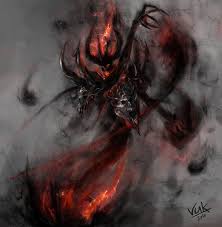fiend

n. 魔鬼;能手;成癖者
n.
恶魔;魔鬼;…迷;…狂
adj.
魔鬼似的;
变形
复数:fiends
英英释义
fiend[ fi:nd ]
n.
a cruel wicked and inhuman person
同义词:monsterdevildemonogre
one of the evil spirits of traditional Jewish and Christian belief
同义词:devildemondaemondaimon
a person motivated by irrational enthusiasm (as for a cause)
同义词:fanatic
双语例句
用作名词(n.)
It was said, that ghost and fiend consorted with him there.
据说魔鬼在那儿与他相会。
Yes, his friends thought he might be possessed by a fiend.
是的,他的朋友都认为他被魔鬼附身。
权威例句
Brittle asthma: fiend or phantom?Dreams of the rarebit fiend
Was the Green Knight a Fiend?
Friend or fiend:prototyping for social cohesion
The World of the Righteous Dope Fiend
Narrow-band FiEnd etalon filters using expanded-core fibers
Analogy– a friend or fiend when solving math problems?
FiEnd filters: passive multilayer thin-film optical filters deposited on fibre ends
Dreams of the Rarebit Fiend: food and diet as instigators of bizarre and disturbing dreams
Gorgons, cars and the frightful fiend: Representations of fear in social work and counselling
fiend
fiend: [OE] Fiend seems originally to have meant ‘hated person’. It was formed in prehistoric times from the past participle of a Germanic verb meaning ‘hate’ (represented in historic times by, for example, Old English fēon, Old High German fiēn, and Gothic fijan). In Old English its meaning had progressed to ‘enemy’ (which is what its German relative feind still means). Then towards the end of the first millennium AD we see evidence of its being applied to the ‘enemy’ of mankind, the Devil. From there it was a short step to an ‘evil spirit’ in general, and hence to any ‘diabolically wicked person’.
fiend (n.)
Old English feond "enemy, foe, adversary," originally present participle of feogan "to hate," from Proto-Germanic *fijand- "hating, hostile" (cognates: Old Frisian fiand "enemy," Old Saxon fiond, Middle Dutch viant, Dutch vijand "enemy," Old Norse fjandi, Old High German fiant, Gothic fijands), from suffixed form of PIE root *pe(i)- "to hurt" (cognates: Sanskrit pijati "reviles, scorns," Greek pema "suffering, misery, woe," Gothic faian "to blame," and possibly Latin pati "to suffer, endure"). According to Watkins, not allied to foe and feud (n.). As spelling suggests, the word originally was the opposite of friend and described any hostile enemy (male and female, with abstract noun form feondscipe "fiendship"), but it began to be used in late Old English for "the Devil, Satan" (literally "adversary") as the "enemy of mankind," which shifted its sense to "diabolical person" (early 13c.). The old sense of the word devolved to foe, then to the imported word enemy. For spelling with -ie- see field. Meaning "devotee (of whatever is indicated)," as in dope fiend, is from 1865.
1. A principal fiend.
魔鬼首领
-- 来源 -- 英汉 - 短句参考
2. an opium fiend
鸦片鬼
-- 来源 -- 英汉 - 短句参考
3. A fiend with computers.
计算机能手
-- 来源 -- 英汉 - 短句参考
4. a fiend at mathematics
数学能手
-- 来源 -- 英汉 - 短句参考
5. A dope fiend.
对毒品上瘾的人
-- 来源 -- 英汉 - 短句参考
6. A crossword-puzzle fiend.
热衷猜字迷的人
-- 来源 -- 英汉 - 翻译样例
7. A devilish person;a fiend.
恶魔穷凶极恶之人;恶魔
-- 来源 -- 英汉 - 短句参考
8. He is a drug fiend.
他是个有毒瘾的人。
-- 来源 -- 轻轻松松背单词-蒋刚
9. a,fresh-air fiend
注重呼吸新鲜空气的人.
-- 来源 -- 英汉 - 翻译参考[网络]
10. Fiend(or fan)for dance
舞迷
-- 来源 -- 英汉 - 翻译样例 - 汉英
